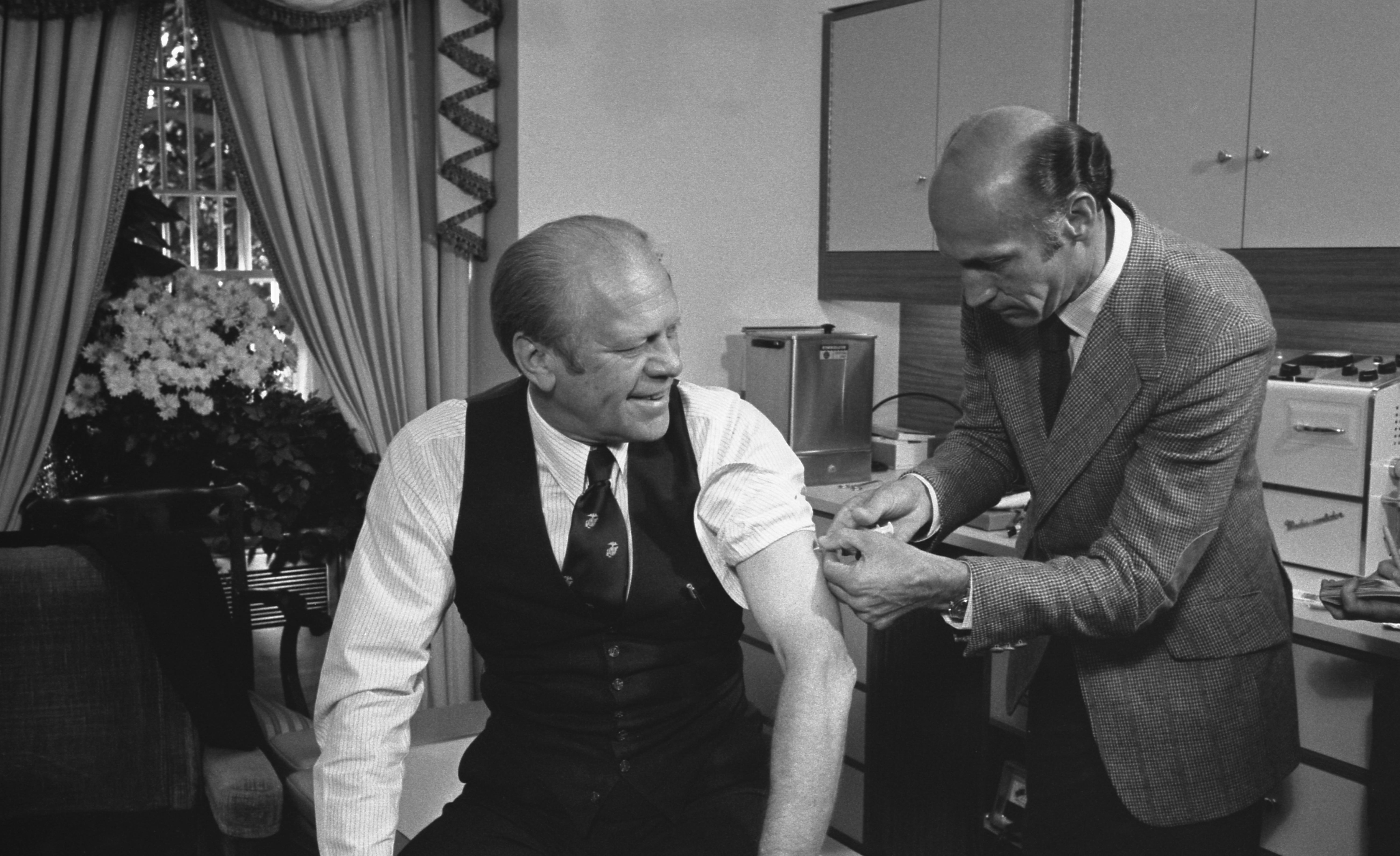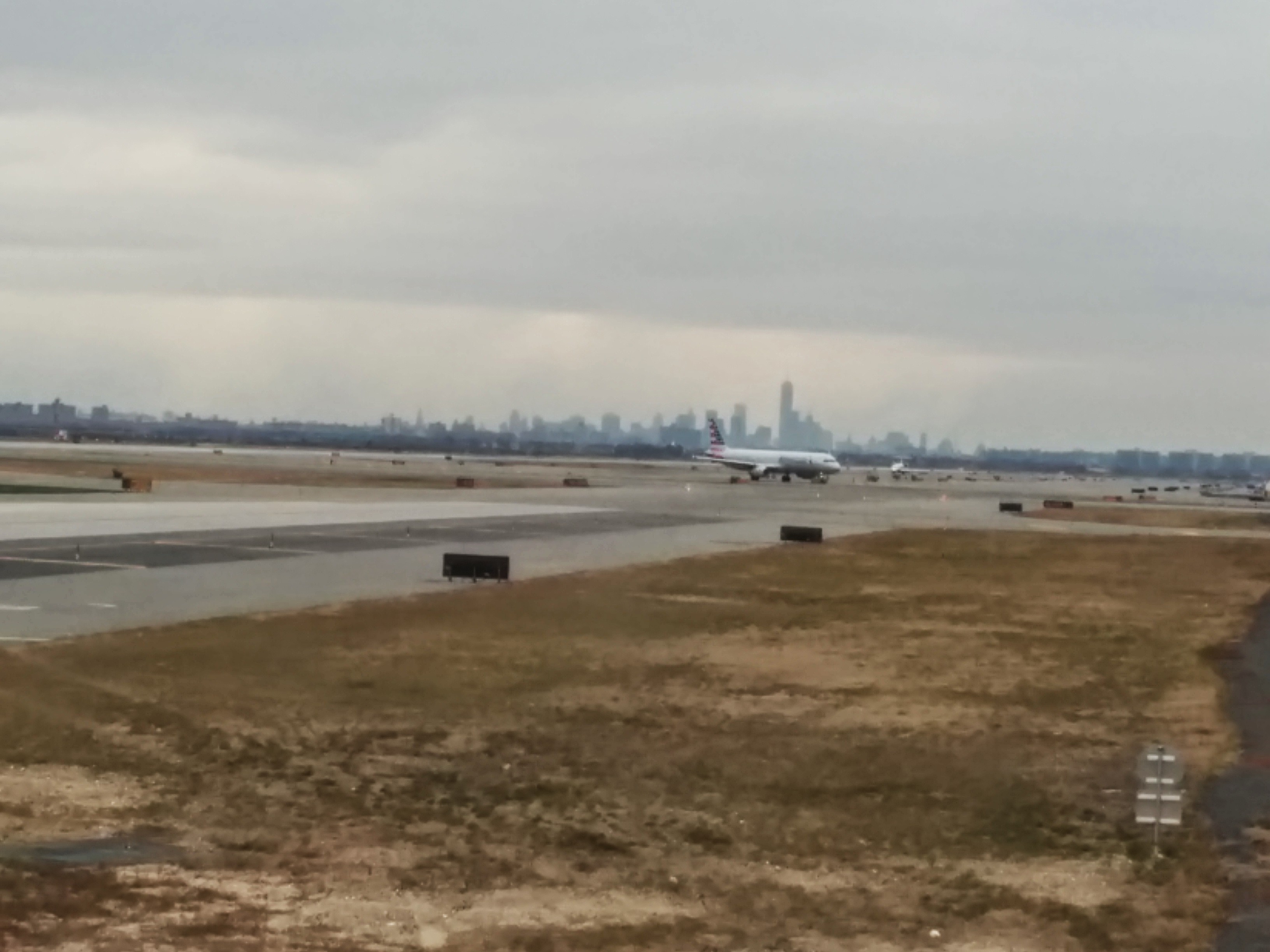Korean fusion
Vaccines and time
Remember the scare about EMFs? Remember Satanic ritual abuse? Remember how cell phones were going to give us brain cancer? The list of things we’ve been afraid of is long, but it changes over time.
That’s something to keep in mind as you consider the current dangerous anti-vaccine movement. Because these scares have no basis in fact, they’re not sticky. They’re fashion trends, and things go in and out of fashion. In particular, it’s worth noting that the anti-vaxx crowd consists of people who like to think they’re smarter than everyone else: lefty liberals, Northern Californians, Silicon Valley tech workers. Once your marvelous insight is shared by the great unwashed masses, it’s time to move on to something else.
Vaccines present an unusual problem because the panic has a meaningful way of manifesting: parents refuse to vaccinate their children. This is different from simply being freaked out about power lines or mobile phones. Nevertheless, I do think there’s some hope that this anti-vaccine trend will taper off with time — especially (alas!) after some children begin to die.
A worrying counter-trend is food fears, which do tend to last: people are still insisting on the dangers of aspartame and MSG and gluten long after the initial studies showing problems with these ingredients were overturned by better studies. I think that’s because of the ritual, almost spiritual quality of food in human life, and I hope that’s the case; if it’s more an issue of being afraid about what we put in our bodies, then the anti-vaccine problem might be stickier than I’m predicting.
Nevertheless, I do think there may be some possibility that the anti-vaccine epidemic, like so many earlier epidemics, will run its course with time. Hopefully we can inoculate ourselves against a recurrence.
Do great things
We often say that we’d do great things if we only had the money, but that’s just an excuse. It’s not the money we’re waiting for; it’s the courage to try something without knowing whether we’ll succeed. It’s the tolerance for risk of failure, not financial failure but actual failure—the realization that you can’t actually do that thing you dream of doing. — Justin Peters
Give women credit
We need to give women artists credit for their creations and creativity. Apparently this is really difficult for a lot of people.
Cheer up trot
Where are the ones who condemn?
This is a question that one hears after atrocities: where are the people of the same group — Muslims or blacks, usually — who condemn the ugly acts of violence perpetrated in their name? I hear this complaint often from supporters of Israel. They are making the case that terrorists who fire rockets into Israel or stab people in synagogues are representatives of the true will of the great mass of Muslims and Arabs. If that’s not true, then where are the Arab and Muslim condemnations of such violence?
The answer is that they are in the places you would expect them to be: the Arab and Muslim press, in the languages spoken by the communities involved. Or they’re easily accessible in the English-language Arab press, where an Arab Muslim cartoonist had this to say about the Charlie Hebdo attack:
I condemn the attacks on the cartoonists even though I don’t agree with the publication’s editorial slant, which I have often found to be hurtful and racist. Nevertheless, I would continue to stand for their freedom of speech.
Which is pretty much what I think too.
This time, the condemnations are easy to see because they’re in cartoon form. Here’s a whole set of Arabic cartoons condemning the attacks. Take a look and remember that there are Arabs and Muslims who are as disgusted and disappointed by murder in the name of Islam as you are, or maybe more so.
The pleasures of transit
I’ve been meditating for the past month, using Headspace (I get it discounted as a Google employee benefit). It’s a series of guided mindfulness meditations hosted by Andy Puddicombe, who sounds like the GEICO Gecko. Each day, the GEICO Gecko tells me to take some deep breaths, leads me through a body scan, reminds me to let thoughts come and go. There are times when I want to do it and times when I very much don’t. But has it been having any effect?
There are few better tests of mindfulness and patience than transit. Yesterday I flew from JFK in New York to Phoenix, on an oversold flight the Saturday before Christmas. I thought of Radiohead:
Transport
Motorways and tramlines
Starting and then stopping
Taking off and landingThe emptiest of feelings
As they announced a last-minute gate change, sending the mass of passengers scurrying across the terminal, I felt the pull of that kind of numb irritation. But I made a choice to approach the experience differently. At that second gate, as an entire planeload of people mobbed the counter, I went to look out the window at the ground crew attaching the terminal ramp to the plane, balancing on a high platform to open the plane door and roll in the food carts, putting down and taking up chocks. I noticed the hashes on the ground for where different models of planes should pull in: 747, 777, Airbus 380, 767, 757. Inside the terminal, a sparrow was darting from window to window. A mother brought her toddler to the window and tried to point out the bird to him, but he was mesmerized by the big metal birds outside.
Getting on the plane, I stood beside the woman who was furious about being in Zone 3 and kept telling the counter staff, with tight-lipped determination, that “overhead space is my biggest concern right now,” as if no one else had luggage and the airline had never had to deal with a situation like hers before. Two different families on the ramp were dealing with crowds of children whose seats were somehow not adjacent to their parents’. On board, the young man next to me was coughing up a lung, and his father in the aisle had an argument with the flight attendant over his already-tagged bag that was supposed to be checked. The cabin was so cold that I kept on my hat and gloves. The pilot announced that our JFK ground time was estimated at 50 minutes.
There was every reason to be sour and annoyed, but somehow I wasn’t. I looked out the window. You could see Manhattan in the distance, the new World Trade Center tower, and the planes taking off in front of us were silhouetted against it. It was beautiful. In the air, I ate my overpriced terminal sandwich, put a travel mix on my headphones and took a nap. I woke up, meditated with Headspace. I tried watching Frozen, but it was terrible, so I turned it off. I looked out the window. By then we were over western Nebraska. There was a stripe of snow, maybe 50 miles wide and hundreds of miles long, across an otherwise undifferentiated flatness of squares and circles, as if a line of clouds had gotten exactly that far and said, “I think I’m gonna go right here.” I thought about how strange it is that I know Seoul and Beijing and Kathmandu better than I’m likely ever to know that farmland, that the chances of finding me in Omaha are far less than the chances of finding me in Phnom Penh or Vientiane. Then the farmland gave way to the layer cake buttes and canyons and the snowy mountains of New Mexico, and after a while that landscape changed into badlands where the icy rivers splayed out like white fractals, and then the land stepped down into the Arizona desert. It was beautiful. I took out my laptop and wrote about it, and I noticed that when I’ve meditated and been sober — the one other time I kept it up was when I lived in Korea — I’ve written more and more freely. I almost didn’t want the flight to end. Almost.
*
There are two related thoughts that transit evokes: that nowhere is anywhere, and that everywhere is everywhere else.
The first thought is the numbness that comes over us, the feeling that we’re in non-space, non-time. It’s easy to feel like a dead thing when you’re in the TSA line. (As Talking Heads put it, “I’m tired of looking out the windows of the airplane / I’m tired of traveling, I want to be somewhere.”)
The second thought is the unnerving feeling that planes and technology are shrinking the world, that there is no escape, that wherever you go will be the same as wherever you left. This illusion is brought on by the weird sameness of airports, airplanes, transit lounges, duty free shops, chain hotels. But these places need to be legible and at least minimally palatable to travelers from everywhere, and they need to be interoperable with planes coming in from wherever. Airports aren’t the world. The world is still out there in all its everyday strangeness. Omaha retains its mystery, if you’re open to that.
But contra Talking Heads, nowhere is nowhere, and everywhere is somewhere — even airplane cabins and duty free shops. We’re always in transit: through time, through space. We’re always between things. Something is always ending, something has always not yet begun. But we are always somewhere. And I’m finding, for myself, that the simple practice of noticing where I am makes being there less frustrating, more interesting, more worthwhile. It’s counterintuitive, but when I stop resisting the irritations, stop forcing them away, they lose much of their power. Even at the airport.
7 thoughts about The Interview
People know I’m into Korean things, so they’re asking me what I think about The Interview, the hacking of Sony Pictures Entertainment, and the subsequent pulling of the film from theaters.
1. The quality of the film is irrelevant
This point seems to confuse a lot of people, who are busy debating whether the film is The Great Dictator. As part of that debate, some are pointing out that The Interview is “a bad film.” This is kind of unfair considering that no one has seen it. But more importantly, it’s utterly irrelevant. So what if it’s terrible? Sony didn’t get hacked because the movie was good or bad, and the movie didn’t get pulled from theaters based on its quality. In geopolitical and ethical terms, the quality of the movie is a non-issue.
2. It’s OK to make a movie about assassinating a sitting head of state
It might or might not be in poor taste, depending on your taste. But it’s not wrong. Hollywood produces and distributes movies on every conceivable topic, glorifying all kinds of horrific violence, depicting the destruction of the United States, and on and on. One of the great classics of American cinema is about our own government plotting to bring about global nuclear armageddon. The Interview might be a lot of things, but incitement it is not, and it falls easily into the realm of speech that’s protected.
3. It’s OK to make fun of North Korea
Again, you might or might not find it to be in poor taste. But it’s OK to make a movie that makes fun of Hitler (cf. The Great Dictator, The Producers) or a comedy set in the Holocaust (Life Is Beautiful), or even a film that makes fun of a Kim who rules North Korea (Team America). The Atlantic gets it completely wrong in saying that North Korea isn’t funny. North Korea is hilarious, as dictatorships usually are, and one of the best weapons against them is humor.
North Korea’s leaders have been the butt of jokes on SNL, 30 Rock, in Team America, and elsewhere because they’re self-important buffoons. They should be lampooned. Dictators everywhere should be lampooned. Democratic leaders should also be lampooned. Making fun of the people in charge is important work.
4. Seth Rogen and James Franco are acting courageously
And as for that Atlantic article insisting that the film is “not an act of courage” like The Great Dictator because Hitler was at the height of his powers and North Korea is weak? Declaring that “it takes no valor and costs precious little to joke about these things safely oceans away from North Korea’s reach”? Well, it appears that North Korea has been able to hit Seth Rogen and his backers harder than Hitler ever hit Charlie Chaplin and his backers. North Korea has been known to assassinate people it doesn’t like, and quite famously kidnapped and enslaved a couple of South Korean movie people when they were in Hong Kong.
No, North Korea appears not to have gone after Trey Parker or Margaret Cho. But they might have. And they have gone after Rogen and Franco.
5. Sony and the film distributors aren’t cowards
Sony Pictures got hit really hard. Nobody died, so this isn’t the sort of thing where we ought to respond with missile strikes. But their business was paralyzed. And Sony Pictures is a business. And businesses are not moral human beings who take a stand. There is no Martin Luther King, Jr., Inc. Businesses are risk-averse organizations with a profit motive. None of these companies want to risk their holiday-season profits, and none of them want to risk being involved in the actual violence that’s been threatened.
Nor does Sony Pictures have the sense that the US government has their back. This form of cyberterrorism is new, and the US doesn’t know what to do about it exactly. We can’t call in the National Guard and ground all the planes. Sony Pictures is kind of on its own right now, and that’s not a comfortable place to be. I don’t blame them for not wanting to go to war with North Korea over Christmas.
6. We still don’t know whether it really was North Korea
Don’t forget that. These sort of attacks are hard to pin down. It might be a disgruntled former employee. We just don’t know.
7. Isolating North Korea’s economy is not the answer
The other bit of important news this week — way more important than this whole Interview situation — is America’s at-long-last opening with Cuba. We’ve been maintaining a policy of isolation for decades, and it has failed to topple the government of Cuba, resolve human rights issues there, or really serve our interests in any useful way.
So what do we want to do in response to North Korea’s hack attack? Cut off their dollars.
Corporations, as I said, are risk-averse. They don’t like wars or conflicts because they’re hard to predict in quarterly estimates. North Korea is free to be belligerent because it doesn’t have influential corporations. But there is business in North Korea, much of it controlled by the military. Rather than further isolating and limiting that business, it might make more sense to engage with it, embedding it in the global system that makes war unthinkable between any two major economic powers. If North Korean leadership had something significant to lose beyond their own borders, they might be more hesitant to threaten and attack. The way that happens most effectively in today’s world is through international trade.
North Korea doesn’t make that easy, but it may be the best bet for creating a class of influencers in North Korea who have an ownership stake in something significant and who will press within the system for a more moderate approach to the outside world.
Update: President Obama has now confirmed that North Korea is behind the hacking and said that he thinks Sony Pictures made a mistake in pulling the release of The Interview, though he is sympathetic. Sony Pictures responded, putting the blame on the theater distributors and claiming that they are still looking into ways to release the movie.
Hanukkah
Hanukkah is a dumb holiday, and it’s my favorite.
I grew up with a weird amalgam of Jewish influences: an early childhood of high-style Reform Judaism gave way to my parents’ increasing devotion to the Chabad Lubavitch brand of Chassidic Orthodox Judaism, while I spent my summers at the Conservative Jewish Camp Arazim and attended the nominally Orthodox, highly disorganized and very Russian Hebrew Academy of San Francisco from third through eighth grade. My Judaism was pulled in different directions. I loved the high-church elegance of Reform, but it was pretty square, and I suspect I would have found it boring had I stuck with it into my adolescence. Orthodox Judaism, and especially Chabad, was full of baffling rules and boring prayer and eternal Saturdays full of Monopoly games and quietly setting fire to things while waiting for the sun to go down, but it offered periodic bursts of completely batshit alcohol-fueled celebration from which teenagers were by no means excluded. (The Hamantashen Riot of ’87, at a shul in San Francisco, became something of a legend.) And Conservative Judaism, sitting somewhere in the middle, was too chummy and too Zionist, but its passion for teaching young Jews to hook up with other young Jews was pretty compelling that summer I turned 16.
Today my connection to Judaism as a religion is pretty tenuous, and mostly it involves family: I go to shul when I visit my parents or my brother, who’s studying to be a rabbi, or I go to holy sites in Israel with my sister, or I go to the Passover seder out on Long Island with cousins. There’s not much that I do on my own. But I do Hanukkah.
Hanukkah is a dumb holiday because it celebrates the victory of a short-lived fundamentalist movement over the forces of tolerance, and it’s a dumb holiday because the attention it receives in America today is a product of American Jews’ desire for something to compete with Christmas. If you’re a Christian, the birth of Jesus is pretty important. If you’re a Jew, the victory of the Maccabees over the Assyrian Greeks is pretty low on the list of important things. It’s like a holiday celebrating the Battle of Manila or something.
Hanukkah is maybe the only part of Judaism that bridges the different parts of my Jewish experience. I loved it when I was little, when we would light the menorahs in the high windows of our formal living room that faced out to the street, and then sit in the part of the house we saved for special occasions and unwrap presents. Presents are excellent. Anticipating another one tomorrow is excellent. Getting the biggest Space Lego set of the year is beyond excellent. Gold-wrapped chocolate is OK too, not great, but who’s gonna complain about chocolate? Dreidel is a stupid game, but that’s OK because no one actually plays it. Hanukkah music is terrible, but who listens to Hanukkah music? We listened to my parents’ psychedelic rock records from the sixties. Latkes are great and we probably had them, I don’t know; I was busy with the Legos.
As my family became more Orthodox, holidays that had once been breezy and fun, like Passover or Purim or Simchas Torah, began to involve long compulsory prayer sessions and elaborate rules and restrictions. But that never happened to Hanukkah. Hanukkah was still about candles and presents, without much in the way of additional prayer time. And the new rules made Hanukkah better, because it meant we now set fire to olive oil instead of candles, and playing with fire is always improved by added complexity and liquid fuel. Even the Chabad menorah lightings in San Francisco’s Union Square managed to add to the awesome: they were trips to the city, at night, and one year Carlos Santana played.
There have been years when I missed Hanukkah. I didn’t light the candles when I was in India, and I don’t remember lighting them when I lived in Korea either. But I’ve lit candles in all my different homes in New York City over the years, and with my family in Playa del Carmen (where dueling Chabads have dueling menorah lightings). I lit candles tonight, in the window, in a kosher menorah, and I’ll keep lighting the candles through the end of the holiday, which I get to finish out this year with my family in Arizona. And next year, when I’m off somewhere in Southeast Asia, maybe I’ll drop in on a Chabad House or find some Israelis and do Hanukkah there too. If there’s one thing I’ve learned in my world travels, it’s that you can find sufganiyot anywhere.





